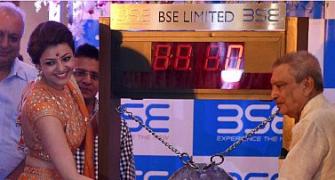The global scenario implies that institutions will wait till there is more clarity on the Budget, explains Devangshu Datta.
 In Moliere's comedy, Le Bourgeois Gentilhomme (The Middle-class Gentleman), Monsieur Jourdain was surprised and delighted to learn that he had always spoken prose.
In Moliere's comedy, Le Bourgeois Gentilhomme (The Middle-class Gentleman), Monsieur Jourdain was surprised and delighted to learn that he had always spoken prose.
On January 30, Indians were surprised to learn that acche din had happened, months before the Modi sarkar was voted into power on the promise of making it happen!
However, claims that growth accelerated to 6.9 per cent in 2013-14 were greeted by scepticism, rather than delight.
Among others, Reserve Bank of India (RBI) Governor Raghuram Rajan indicated his doubts about the new data, when he pointed out there was a surprising amount of slack in the economy.
The rebasing of gross domestic product (GDP) data to base year 2011-12 was routine.
The switch to value-added computation of GDP, from earlier expenditure-based computation, was not.
The size of the economy in March 2014 is reckoned to be about the same by both methods. So this does not affect the fiscal deficit much.
But the new series pegs the economy as smaller in 2011-12. Therefore, it grew faster in 2012-13 (5.1 per cent versus the earlier 4.5 per cent estimate) and in 2013-14 (6.9 per cent instead of 4.7 per cent). We will learn about this fiscal's growth rates today.
The RBI held policy rates steady in its February review, though it did cut the statutory liquidity ratio (SLR). Lower SLR allows banks to reduce exposure to government debt and lend to corporates, if they want to.
Rajan also made it clear that he wants banks to "transmit" lower policy rates by cutting commercial lending rates. The central bank will want to see the Budget and digest the new numbers. Prima facie, if GDP is growing at 7 per cent or more, the case for easing monetary policy is not very strong.
The problem with the new data is that there is little supporting evidence for a strong revival. Vehicle sales stuttered through 2013-14. Construction and real estate remain in the doldrums. Banks have ample liquidity and see little credit demand.
There were a record number of corporate debt restructuring requests. Cargo traffic at ports and on the railways stagnated. Corporate earnings and revenues grew slowly, barely keeping pace with inflation through the past two fiscals.
Even in Q3, 2014-15 (October-December 2014), earnings growth looks muted. The RBI describes economic conditions as "subdued".
So far, 33 Nifty companies have announced results. On consolidated basis, with extraordinary income adjusted, their net profits are lower than the corresponding figures from Q3, 2013-14.
There has been some disillusionment about the Bharatiya Janata Party (BJP)'s ability to speed up growth inside a reasonable time frame.

Those doubts could manifest into votes for its rivals in the Delhi Assembly elections. If the BJP doesn't get a majority in Delhi, there will be some bearish impact on capital markets.
Parliament's Budget session will be watched for indications on many different fronts. The Budget itself is obviously important.
The fiscal deficit must be kept under some control in 2015-16 though an overshoot of 2014-15 projections of 4.1 per cent of GDP is likely.
Investors also want the Budget to set more ambitious targets for both growth and fiscal consolidation.
It is also very important that the government can demonstrate its ability to push through legislation and ratify ordinances, to keep hopes of reform alive. Otherwise, an obdurate Rajya Sabha could just force a series of ordinances, which lapse without ratification.
In the meantime, an unprecedented situation is developing across markets in Europe. Switzerland, Finland, Denmark, Holland and Germany have all seen government treasuries (including long-tenor treasuries like six-year German bonds and 13-year Swiss bonds) sold for negative yields.
That is, bonds are being bought at such large premiums to face value that the yield to maturity is negative. Even corporate bonds from Nestle and Shell have traded at negative yields.
This will surely lead to the rewriting of economic theory about the "lower bound of zero". But it's difficult to say what it will do to currency markets and by extension, to global trade.
Oil has rebounded 20 per cent from six-year lows, and fallen again. The Greeks have delivered a shock and the Ukrainian Hryvnia has been utterly crushed.
The RBI is adding to reserves, already at record levels. At about $327 billion, India now has about eight to nine months of import cover.
The Nifty has lost ground for six sessions. It is down 3.7 per cent from its peak. This is the longest losing streak since 2013.
A pre-Budget bearish trend is unusual. But the volatile global scenario makes it likely that institutions will sit on the fence until there is some clarity about the Budget.










